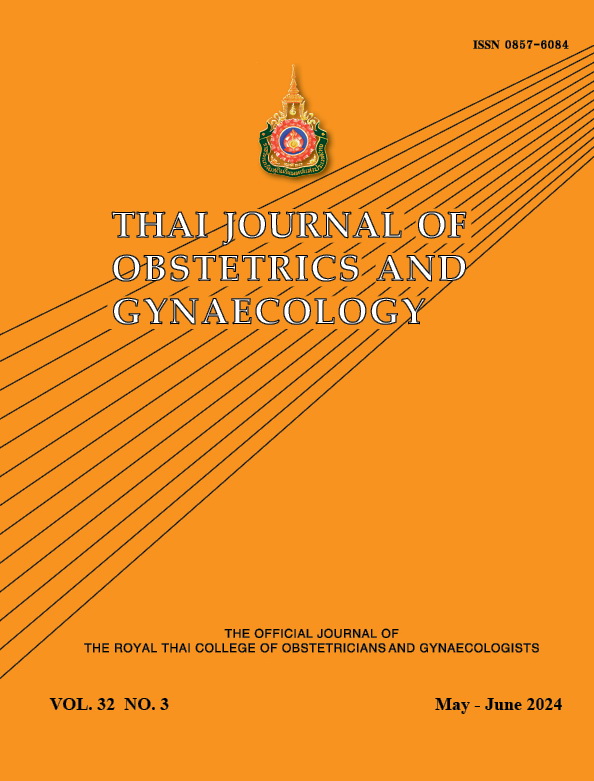Intravenous Dexamethasone for Preventing Postoperative Nausea and/or Vomiting in Total Abdominal Hysterectomy: A randomized double-blinded, placebo-controlled trial
Main Article Content
Abstract
Objectives: To assess the efficacy of postoperative dexamethasone compared to placebo in reducing the incidence of postoperative nausea and/or vomiting (PONV) in women undergoing benign total abdominal hysterectomy (TAH).
Materials and Methods: Participants who were scheduled for TAH with or without adnexal surgery between August 2022 and April 2023 were included. The participants were randomly divided into two groups: the dexamethasone group (n = 43), who received 2 ml (8 mg) of intravenous dexamethasone injection, and the control group (n = 43) received 2 ml of normal saline at 2 hours after surgery.
Results: There was no significant difference in the incidence of PONV within 24 hours between the dexamethasone group and control group (32.6% vs 48.8%, relative risk 0.67(95% confidence interval 0.39 to 1.13), p = 0.09). The need for antiemetic drugs was not statistically different between groups (0% vs 9.3%, p = 0.05), and without serious adverse events in both groups. The dexamethasone group experienced a lesser pain score than the control group at 24 hours (4.7 ± 1.5 vs 5.8 ± 2.2, p = 0.01) after surgery. There was no difference in additional analgesic requirements.
Conclusion: The administration of 8 mg of intravenous dexamethasone postoperatively did not result in a significant reduction in PONV within the first 24 hours following benign TAH.
Article Details

This work is licensed under a Creative Commons Attribution-NonCommercial-NoDerivatives 4.0 International License.
References
Apfel CC. Postoperative nausea and vomiting. In: Miller RD, Eriksson LI, Fleisher LA, Wiener-Kronish JP, Young WL, editors. Miller’s anesthesia. 7th ed. Philadelphia: Churchill Livingstone 2009;2729-55.
Ioannidis JP, Hesketh PJ, Lau J. Contribution of dexamethasone to control of chemotherapy-induced nausea and vomiting: a meta-analysis of randomized evidence. J Clin Oncol 2000;18:3409-22.
Shaikh SI, Nagarekha D, Hegade G, Marutheesh M. Postoperative nausea and vomiting: A simple yet complex problem. Anesth Essays Res 2016;10: 388-96.
Moore SG. Intravenous dexamethasone as an analgesic: A literature review. AANA J 2018;86:488-93.
Gu YL, Xie JM, Ren J, Cao H, Wei JR, Chen C, et al. Dexamethasone-sparing regimen is an effective and safe alternative in overall antiemetic protection A systematic review and meta-analysis. Medicine (Baltimore) 2019;98:e17364:1-10.
Falcone T, Ridgeway B. Hysterectomy. In: Berek & Novak’s gynecology. 16th ed. Philadelphia, Baltimore, New York, London: Wolters Kluwer 2020;653-77.
Weibel S, Rucker G, Eberhart LH, Pace NL, Hartl HM, Jordan OL, et al. Drugs for preventing postoperative nausea and vomiting in adults after general anesthesia: a network meta-analysis. Cochrane Database Syst Rev 2020;19:2129-30.
Wang JJ, Ho ST, Tzeng JI, Tang CS. The effect of timing of Dexamethasone administration on its efficacy as a prophylactic antiemetic for postoperative nausea and vomiting. Anesth Analg 2000;91:136-9.
Selzer A, Pryor KO, Tangel V, Connell KO, Kjaer K. The effect of intravenous dexamethasone on postoperative nausea and vomiting after cesarean delivery with intrathecal morphine: a randomized-controlled trial. Can J Anaesth 2020;67:817-26.
Parthasarathy P, Babu K, Rao RR, Raghuram S. The effect of single-dose intravenous dexamethasone on postoperative pain and postoperative nausea and vomiting in patients undergoing surgery under spinal anesthesia: A double-blind randomized clinical study. Anesth Essays Res 2018;12:313-7.


